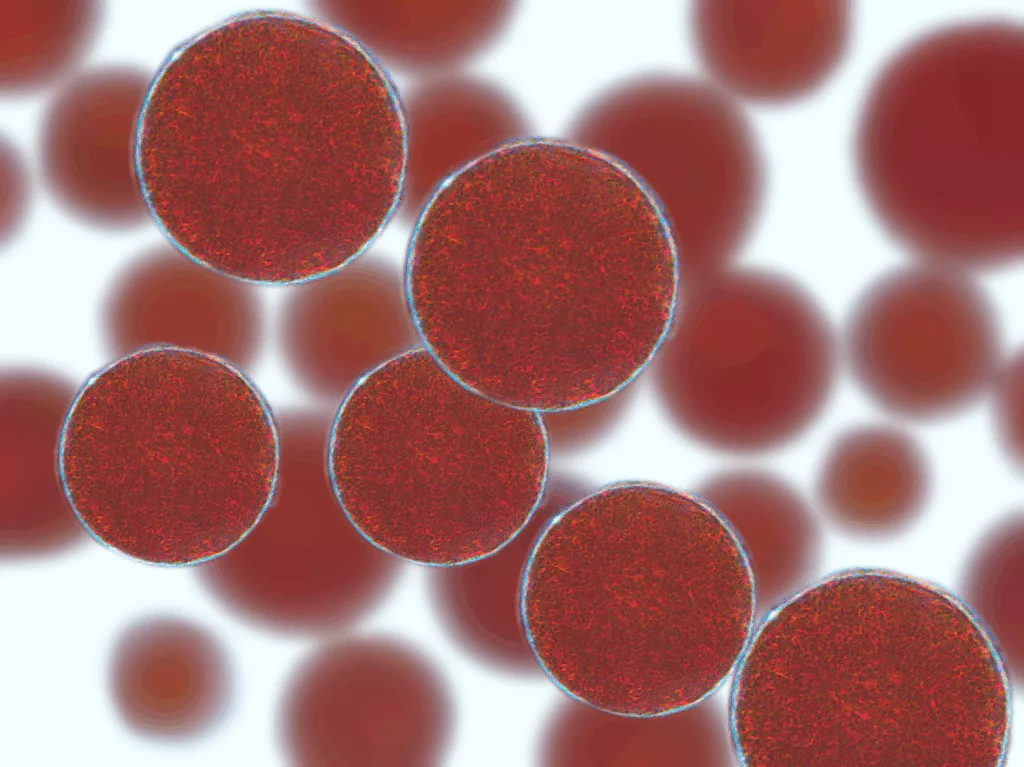Health Benefits
Natural astaxanthin from microalgae Haematococcus Pluvialis is a naturally occurring carotenoid that can be found in environments ranging from Arctic marine environments to common freshwater rock pools throughout the world.
Immune Function

Our immune system relies on a delicate balance of free radicals and antioxidants to fight infections. Excessive production of reactive oxygen species due to ageing or compromised health can induce oxidative stress and harm immune cells. Studies show that astaxanthin enhances immune response by boosting T- and B-lymphocyte activity while protecting cells from oxidative damage. Additionally, astaxanthin has anti-inflammatory properties, helping to regulate cytokine production and suppress the overactive immune responses in conditions like chronic inflammation.
Benefits of Natural Astaxanthin:
- Strengthens and balances the immune system
- Protects immune cells against oxidative stress
- Fights chronic inflammation
- May enhance immune cell activity and antibody production
- May improve and balance immune responses
References
Park JS, Chyun JH, Kim YK, Line LL, Chew BP. Astaxanthin decreased oxidative stress and inflammation and enhanced immune response in humans. Nutr Metab (Lond). 2010 Mar 5;7:18.
Baralic I, Andjelkovic M, Djordjevic B, Dikic N, Radivojevic N, Suzin-Zivkovic V, et al. Effect of Astaxanthin Supplementation on Salivary IgA, Oxidative Stress, and Inflammation in Young Soccer Players. Evid Based Complement Alternat Med. 2015;783761.
Muscle Performance, Endurance and Recovery

Astaxanthin is a powerful antioxidant that helps protect muscles from damage and inflammation caused by intense exercise. Studies show that supplementing with natural astaxanthin can reduce oxidative stress, lower inflammation markers like C-reactive protein (CRP), and improve recovery in athletes. It also enhances endurance by reducing lactic acid buildup and supporting energy production in muscle cells.
Research suggests astaxanthin may even help prevent muscle weakness with age, improving strength and physical performance. Athletes and active individuals taking astaxanthin have reported increased power output, faster recovery, and reduced fatigue, making it a promising supplement for both fitness and longevity.
Benefits of Natural Astaxanthin:
- Reduces oxidative stress, excessive inflammation and muscle damage
- Improves muscle endurance and recovery
- Lowers lactic acid buildup and fatigue
- Enhances fat metabolism by protecting muscle mitochondria from oxidation
- Decreases muscle function loss in ageing (sarcopenia)
References
Yamashita E. A New Approach to Body Fat Reduction by Astaxanthin During Exercise. Anti-Aging Therapeutics. 2010;12:345–59.
Brown DR, Gough LA, Deb SK, Sparks SA, McNaughton LR. Astaxanthin in Exercise Metabolism, Performance and Recovery: A Review. Front Nutr. 2017;4:76.
Liu SZ, Ali AS, Campbell MD, Kilroy K, Shankland EG, Roshanravan B, et al. Building strength, endurance, and mobility using an astaxanthin formulation with functional training in elderly. J Cachexia Sarcopenia Muscle. 2018 Oct;9(5):826–33.
Brown DR, Warner AR, Deb SK, Gough LA, Sparks SA, McNaughton LR. The effect of astaxanthin supplementation on performance and fat oxidation during a 40 km cycling time trial. J Sci Med Sport. 2021 Jan;24(1):92–7.
Brain Health

The brain is the body’s most energy-demanding organ, using about 20% of our total energy despite making up only 2% of body weight. This high energy demand generates oxidative stress, making the brain especially vulnerable to damage from free radicals and inflammation. Even the process of creating and storing memories can increase oxidative stress.
Studies show that chronic inflammation and oxidative damage are linked to cognitive decline, slower processing speed, and memory loss as we age. Clinical research suggests that supplementing with antioxidants that have the ability to cross the blood-brain barrier, such as astaxanthin may help protect brain cells, improve cognitive function, and support healthy brain ageing. Studies indicate that natural astaxanthin may improve reaction time, memory, and mental fatigue.
Benefits of Natural Astaxanthin:
- Decreases oxidation of red blood cells (important for prevention of dementia)
- Enhances capillary blood flow and antioxidant capacity
- Modulates blood pressure, lowering stroke risk and improves vascular endothelial health
- Improves cognitive responsiveness (information processing capacity and selective attention, relevant in areas like problem-solving and multitasking), working memory, memory sharpness and mood
References
Satoh A, Tsuji S, Okada Y, Murakami N, Urami M, Nakagawa K, et al. Preliminary Clinical Evaluation of Toxicity and Efficacy of A New Astaxanthin-rich Haematococcus pluvialis Extract. J Clin Biochem Nutr. 2009 May;44(3):280–4.
Nakagawa K, Kiko T, Miyazawa T, Carpentero Burdeos G, Kimura F, Satoh A, et al. Antioxidant effect of astaxanthin on phospholipid peroxidation in human erythrocytes. Br J Nutr. 2011 Jun;105(11):1563–71.
Hongo N, Fujishita M, Takihashi J, Tominaga K. Randomized controlled trial of the anti-fatigue effects of astaxanthin on mental and physical loads simulatin daily life. J Clin Therap Medicine. 2016;32(7):577–91.
Vision & Eye Health

With screen time on the rise, about 80% of adults, and an increasing number of children experience digital eye strain. This discomfort stems from long hours staring at screens, which expose our eyes to high-energy blue light and require constant focus adjustments.
Normally, our eyes accommodate by changing the shape of the lens to shift focus between near and far objects, a process controlled by the ciliary muscles. These tiny muscles contract to thicken the lens for close-up vision and relax to thin it for distant focus. However, as we age, oxidative stress and inflammation weaken these muscles and stiffen the lens, making it harder to focus up close—a condition known as presbyopia. Prolonged screen use may further strain the ciliary muscles, leading to eye fatigue, headaches, dry eye, and difficulty adjusting focus.
Antioxidants play a crucial role in protecting the eyes from oxidative stress by neutralizing harmful free radicals. Active ingredients, like natural astaxanthin, help maintain lens flexibility, support ciliary muscle function, and reduce inflammation, potentially slowing eye aging and preventing Computer Vision Syndrome (CVS) in both adults and children.
Benefits of Natural Astaxanthin:
- Reduces oxidative stress and eye inflammation
- Improves subjective and objective symptoms linked to Computer Vision Syndrome and eye fatigue
- Reduces ciliary muscle fatigue, and improves the eye muscles’ endurance and recovery, resulting in better eye accommodation and vision sharpness
- Enhances capillary blood flow (for better nourishment of the key structures in the eye and efficient removal of metabolic waste and harmful byproducts)
References
Hecht KA, Marwah M, Wood V, Nishida Y, Bach AE, Gerson J, et al. Astaxanthin (AstaReal®) improved acute and chronic digital eye strain in children: a randomized double-blind placebo-controlled trial. Adv Ther. 2025 Feb 27.
Nagaki Y, Mihara M, Takahashi J, Kitamura A, Horita Y, Sugiura Y, et al. The effect of astaxanthin on retinal capillary blood flow in normal volunteers. J Clin Ther Med. 2005;21(5):537–42.
Hashimoto H, Arai K, Hayashi S, Okamoto H, Takahashi J, Chikuda M. The effect of astaxanthin on vascular endothelial growth factor (VEGF) levels and peroxidation reactions in the aqueous humor. J Clin Biochem Nutr.
Gastrointestinal Health

Oxidative stress and inflammation play a key role in the development of gastrointestinal diseases by damaging cells and disrupting the gut’s protective barriers. A well-known example is Helicobacter pylori (H. pylori), a bacterium that infects the stomach lining, triggering chronic inflammation and oxidative stress, which can lead to ulcers and even gastric cancer.
As we age, these processes worsen, contributing to shifts in gut flora—beneficial bacteria decline while harmful microbes thrive, further promoting inflammation and digestive issues.
Clinical studies suggest that astaxanthin supplementation helps neutralize oxidative stress and may reduce inflammation and promote the growth of beneficial bacteria in the gut, offering a protective effect against gastrointestinal disorders.
Benefits of Natural Astaxanthin:
- Ameliorates chronic active inflammation caused by H. pylori
- Reduces clinical symptoms of non-ulcer dyspepsia, gastritis, gastric and duodenal ulcers
- Maintains gut microbiota homeostasis
Kupcinskas L, Lafolie P, Lignell A, Kiudelis G, Jonaitis L, Adamonis K, et al. Efficacy of the natural antioxidant astaxanthin in the treatment of functional dyspepsia in patients with or without Helicobacter pylori infection: a prospective, randomized, double-blind, placebo-controlled study. Phytomedicine. 2008 Jun;15(6–7):391–9.
Skin Health

The skin is the largest organ of the body, consisting of multiple layers each of which have unique and important functions. As we age, our skin undergoes changes in all three layers, leading to visible signs of ageing. UV-induced lipid peroxidation in the outermost layer, the stratum corneum, may result in moisture and natural oils loss, causing skin dryness and rough texture. The epidermis, where melanin is produced, can develop age spots and uneven pigmentation due to inflammation and sun exposure. Deeper down, the dermis—which houses collagen and fibroblasts—loses elasticity, leading to wrinkles and sagging skin. Moreover, reduced blood flow in the deepest layer of skin, hypodermis, can result in poor nutrients supply and accumulation of waste metabolic products.
Natural astaxanthin plays a crucial role in skin health at all layers, acting as a potent antioxidant, anti-inflammatory, and cellular-restoring agent. When is used as a combination of ingestible and topical formulations, natural astaxanthin can significantly contribute to beauty from both within and out.
Benefits of Natural Astaxanthin:
- Enhances skin elasticity by strengthening the collagen in dermis
- Reduces fine lines and wrinkles size by supporting skin hydration and promoting smooth skin
- Reduces age spots/skin pigmentation
- Revitalizes photoaged skin by quenching free radicals in all dermal layers, and protecting the skin against UV-induced oxidative damage
Tominaga K, Hongo N, Karato M, Yamashita E. Cosmetic benefits of astaxanthin in human subjects. Acta Biochim Pol. 2012;59(1):43–7.
Cardiometabolic Health

The compromised cardiometabolic homeostasis with ageing includes diminished glucose and fat metabolism, impaired blood sugar and lipid profile, insulin resistance and consequently, diabetes and heart problems. This compromised state that aggravates chronic inflammation is linked to mitochondria dysfunction induced by oxidative stress. Maintenance of healthy mitochondria and metabolic regulation is key to long-term health during ageing.
Clinical studies suggest that supplementation with AstaReal® Astaxanthin, in addition to mitochondria support, can significantly alleviate inflammation, improve lipid and glucose measures and cardiac functioning. These findings highlight the potential role of astaxanthin in prevention or alleviation of coagulation disorders, diabetic cardiovascular complications including diabetic cardiomyopathy and stroke in older age.
Benefits of Natural Astaxanthin
- Increased total antioxidant capacity, and reduced oxidative stress
- Reduced inflammatory cytokines and attenuated haemostatic disorders
- Enhanced capillary circulation
- Reduced fasting blood sugar and insulin resistance
- Improved blood lipid profile, including lowered LDL-cholesterol, and Total cholesterol to HDL-cholesterol ratio, and increased HDL-cholesterol
Karppi J, Rissanen TH, Nyyssönen K, Kaikkonen J, Olsson AG, Voutilainen S, et al. Effects of astaxanthin supplementation on lipid peroxidation. Int J Vitam Nutr Res. 2007 Jan;77(1):3–11.
Reproductive Health

Besides ageing & delayed parenthood, several lifestyle and environmental factors contribute to increased oxidative stress and inflammation, negatively impacting fertility in both men and women. These factors include, but are not limited to, poor diet, a sedentary lifestyle, obesity and metabolic disorders, chronic stress, sleep deprivation, smoking and alcohol intake, as well as environmental pollutants that contribute to weakened antioxidant defences.
Oxidative stress and inflammation play a major role in fertility problems in both men and women by damaging reproductive cells and disrupting hormonal balance. In men, excessive oxidative stress can harm sperm DNA, reduce motility, and lower sperm count. In women, it can affect egg quality, impair implantation, and contribute to conditions like polycystic ovary syndrome (PCOS) or endometriosis. For couples struggling with infertility, a diet rich in antioxidants or targeted supplementation may support better outcomes.
Benefits of Natural Astaxanthin in Women:
- Improved metabolic profile in PCOS patients: lowered LDL-cholesterol, and Total cholesterol to HDL-cholesterol ratio, increased HDL-cholesterol, reduced fasting blood sugar and insulin resistance
- Enhanced total antioxidant capacity, and reduced oxidative stress
Benefits of Natural Astaxanthin in Men:
- Maintained mitochondrial energy output
- Reduced oxidative stress, sperm membrane lipid peroxidation and DNA fragmentation
- Enhanced sperm count (concentration) and viability
- Improved sperm motility and its membrane fluidity
- Enhanced sperm capacitation and improved enzyme release from the sperm head for fertilization
- Stronger sperm bonding with the egg
Jabarpour M, Aleyasin A, Shabani Nashtaei M, Amidi F. Astaxanthin supplementation impact on insulin resistance, lipid profile, blood pressure, and oxidative stress in polycystic ovary syndrome patients: A triple-blind randomized clinical trial. Phytother Res. 2024 Jan;38(1):321–30.
